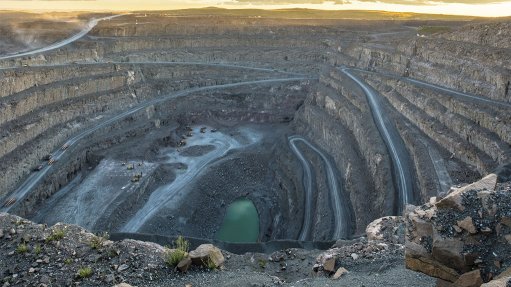Minerals Council highlights progress and challenges of women in mining
With the United Nations having designated the theme of this year’s International Women’s Day as ‘Invest in women: Accelerate progress’, Minerals Council South Africa president and chair of the Women in Mining leadership forum Nolitha Fakude highlighted that the mining industry has played a crucial role in the fight against gender-based violence and femicide (GBVF) in South Africa.
During a media breakfast on March 7, Fakude noted that, through partnerships with the National Prosecuting Authority (NPA) and the GBVF Response Fund, mining companies have pledged financial support to build, refurbish and support the NPA’s Thuthuzela Care Centres that provide support for GBV survivors.
“This year's International Women's Day theme – invest in women – is a call for definitive action that cuts across organisations and the whole mining value chain.
“Not only do we have to collectively make the necessary changes at organisational levels by integrating gender into core business strategies and operational practices, but we're also obliged to do so with our societies to root out social ills, such as the pandemic that is GBV.”
With South Africa having one of the highest GBV rates globally, Women’s Economic Assembly (Wecona) co-chair Dr Futhi Mtoba posited that addressing these challenges required internal efforts from government, policymakers, civil society and the private sector to create an enabling environment for women.
This includes implementing gender-responsive policies, providing targeted financial and technical assistance, promoting gender equality and women empowerment, and fostering an inclusive intrapreneurship ecosystem that supports the growth and success of women-owned businesses.
In this vein, the Minerals Council has redefined the metrics used for its gender diversity and inclusion dashboards.
The Minerals Council embarked on a procurement project to collect historical data over three years – from 2020 to 2022 – on the procurement spend of member companies on women-owned businesses.
The project aims to establish comprehensive, industry-wide baseline data on the support of women-owned businesses through procurement and enterprise and supplier development.
This initiative forms part of the Minerals Council’s transformation agenda and aims to foster an environment that promotes inclusivity, collaboration and the growth of women-owned businesses.
The programme highlighted that procurement spend increased by 24% in 2020/21 and by 30% in 2021/22. Moreover, women-owned businesses received an average of 31% of total procurement spend over the three-year period.
The report also noted that the support women felt they needed from member companies included access to markets and business opportunities, access to financial support, and assistance with compliance to obtain requisite certification, such as International Organisation for Standardisation compliance.
“Using the data we've collected over the past three years, since the launch of our dashboard, we have been able to identify areas that need more attention to further inform our policies and drive a complete culture change across the sector to realise the inclusive, diverse and equitable workforce that will underpin a successful and sustainable mining industry,” said Fakude.
Mtoba noted that the productive potential of South African women in the labour market remained unused, citing the 2022 International Labour Organisation report that highlighted that almost 50% of women between the ages of 15 and 64 were economically inactive in South Africa.
She added that the state of women-owned businesses in South Africa, and Africa more broadly, reflected progress and persistent challenges, meaning that, while the amount of women entrepreneurs across the continent had increased, women still faced various challenges.
These include difficulty in accessing capital, gender-based discrimination, limited access to technology and a lack of digital skills.
Owing to a lack of disaggregated data on women's participation in the economy, Wecona designed a gender participation framework highlighting areas of ownership of business across value chains, employment, pay parity and representation at executive and board levels.
“We partner with the private sector… and assist through securing commitments from sectors and companies. In this way, we aim to accelerate that participation of women,” she expressed.
“Working together, we can accelerate progress towards gender equality,” she added.
Meanwhile, Impala Platinum (Implats) chief technical officer Mark Munroe noted that senior executives in the mining industry had a responsibility to create a space to empower young women in the industry.
To this end, he said Implats remained committed to championing gender diversity and empowering women in the organisation, in communities and in society more broadly through various initiatives.
These include community programmes, bursaries, internships, and youth development initiatives.
“We strive to give women a platform for their voices to be heard, and their talents to be nurtured,” he expressed.
Implats has implemented a comprehensive diversity and inclusion strategy aimed at fostering a culture of care and growth which includes promoting mentoring, and establishing forums to “break the barriers and lead this positive change”.
Hence, he urged mining companies to adopt and implement diversity and inclusion policies, advocate for the inclusion of women in leadership roles, ensure that workplace health and safety measures consider the specific needs of women, and to implement community engagement initiatives for women.
He noted that transformation in this respect would require the allocation of funds for research and development to drive innovation and efficiency within the industry.
“Promoting procurement practices that support and promote women-owned businesses in the supply chain for the mining industry can drive economic empowerment and foster diversity within the industry and within our communities and broader society,” he said.
“By addressing these aspects, investors can contribute to creating a more equitable and progressive mining industry that harnesses the diverse talents and perspectives of both men and women,” he added.
Comments
Press Office
Announcements
What's On
Subscribe to improve your user experience...
Option 1 (equivalent of R125 a month):
Receive a weekly copy of Creamer Media's Engineering News & Mining Weekly magazine
(print copy for those in South Africa and e-magazine for those outside of South Africa)
Receive daily email newsletters
Access to full search results
Access archive of magazine back copies
Access to Projects in Progress
Access to ONE Research Report of your choice in PDF format
Option 2 (equivalent of R375 a month):
All benefits from Option 1
PLUS
Access to Creamer Media's Research Channel Africa for ALL Research Reports, in PDF format, on various industrial and mining sectors
including Electricity; Water; Energy Transition; Hydrogen; Roads, Rail and Ports; Coal; Gold; Platinum; Battery Metals; etc.
Already a subscriber?
Forgotten your password?
Receive weekly copy of Creamer Media's Engineering News & Mining Weekly magazine (print copy for those in South Africa and e-magazine for those outside of South Africa)
➕
Recieve daily email newsletters
➕
Access to full search results
➕
Access archive of magazine back copies
➕
Access to Projects in Progress
➕
Access to ONE Research Report of your choice in PDF format
RESEARCH CHANNEL AFRICA
R4500 (equivalent of R375 a month)
SUBSCRIBEAll benefits from Option 1
➕
Access to Creamer Media's Research Channel Africa for ALL Research Reports on various industrial and mining sectors, in PDF format, including on:
Electricity
➕
Water
➕
Energy Transition
➕
Hydrogen
➕
Roads, Rail and Ports
➕
Coal
➕
Gold
➕
Platinum
➕
Battery Metals
➕
etc.
Receive all benefits from Option 1 or Option 2 delivered to numerous people at your company
➕
Multiple User names and Passwords for simultaneous log-ins
➕
Intranet integration access to all in your organisation


















